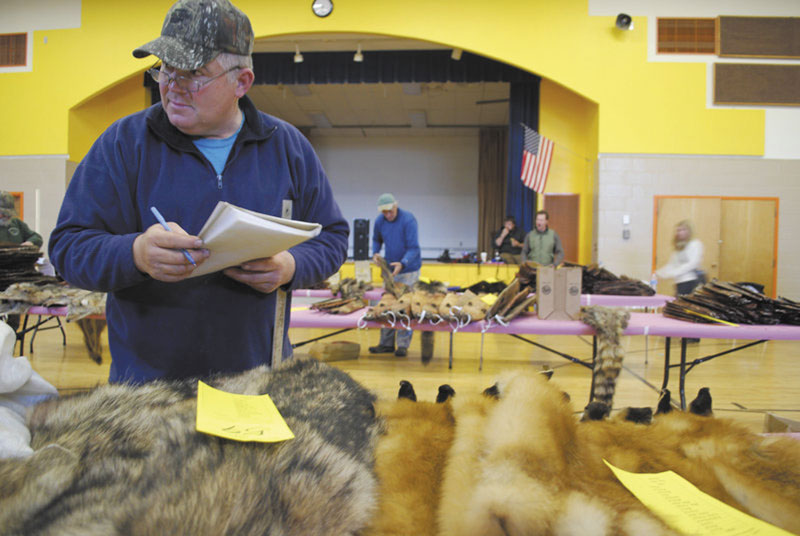PALMYRA — If trapping and fur trade are not topics that interest you, the story of the Palmyra Fur Auction won’t impress. But the reality of this truly age-old event in the heartland of Maine is bigger than even the average Maine trapper considers.
Truth is, the best trappers here ship their choice pelts to international sellers at the North American Fur Auctions in Ontario. And buyers there sell to countries like China, Russia and the Ukraine, where coveted animal-skin coats, dresses and gloves translate into a robust fur market.
For some trappers, that means income off high quantities of mink, fisher, fox and coyote hide, as well as the popular bobcat pelt, which can fetch $500. But at Palmyra’s little auction, it’s mostly about breaking even, or additional income at best.
Out-of-state fur buyers like Guy Johnson of Lakeville, Mass., say they can make in one day at an auction in Alabama or Arkansas what they make at all four of Maine’s auctions.
“This is nothing,” said Johnson, a buyer for 35 years, as he handled fox pelts at the Palmyra Community Center earlier this month.
Still, for trappers like Dan Wagner, a logger and guide from Belfast, it can all add up to help eke a living in the North Maine Woods.
“I just came out of 60 days straight in the woods,” said Wagner, the 37-year-old president of the Maine Trappers Association.
“There’s not a lot of people who do it and there’s never going to be. It’s never going to be super popular. It is always going to be a niche group.”
While fur prices have dropped over the years, down from a time fur was not a controversial commodity, some form of income can be made off a season’s worth of pelts.
Right now, the North American Fur Auctions quotes fur prices for eastern beaver running from $27 to $47, raccoon pelts from $14 to $26, and Eastern coyote from $26 to $47.
But any profit here is always a second or third source of income.
“A fisher can go for $40 to $80, a marten for $100. That’s choice,” said Bill Finney, a Registered Maine Guide who runs a lodge in Patten.
“It has peaks and valleys. The young folks don’t have the same bond to it for one reason or another, mostly because of the climate. They’re not as hearty. But in order to trap, you have to understand what the species do. You need to know what the fox uses. He’s very foxy. He has very, very keen senses.”
Trapping is hard to understand for those who oppose it, and opposition to it is legendary in Maine. Be that as it may, Maine trappers are as emotionally connected to their activity of choice as, say, gardeners or farmers. They view it no differently, really.
“It’s on a par with fishing, the excitement of setting a good fishing line and seeing what you catch. A lot of people wonder why it hasn’t died. The only way to explain it is to go yourself,” Wagner said. “It’s just another way to be close to nature. Some people hike Mount Katahdin once a year and that’s their vacation. I get to be out in these woods every day.”
As buyer Jerry Braley from Kenduskeag handled the fox pelts at the auction last Sunday, he considered a strip of brown fur on one hide.
It’s the tell-tale sign of mange, explains Braley, a trapper for nearly 50 years.
And trappers say that’s part of their activity, thinning wildlife populations that need to be cut back.
“This one was not going to survive. The trapper took the weak one out of the population,” Braley said.
This managing of large wildlife populations is what trappers see. It’s no different than what their forefathers learned from Native Americans centuries ago. Wagner calls it sustainable living, when done right.
Certainly it’s a form of hunting for the most hearty, the robust Mainer willing to walk to hidden groves and along freezing streams. They go to the secret places where the wild things go — and that’s why they do it.
Controversial and even despised? Sure. Trappers know their pastime is disliked and denounced. But for them, it’s still about being as closely connected to nature as a pioneer living off the land.
“I don’t call it a recreation or a sport. It annoys me when people refer to it as a sport,” Wagner said. “It is a way of life. It takes nuances to do, all the things you need to know. It’s on a spiritual level.”
Copy the Story LinkSend questions/comments to the editors.



Success. Please wait for the page to reload. If the page does not reload within 5 seconds, please refresh the page.
Enter your email and password to access comments.
Hi, to comment on stories you must . This profile is in addition to your subscription and website login.
Already have a commenting profile? .
Invalid username/password.
Please check your email to confirm and complete your registration.
Only subscribers are eligible to post comments. Please subscribe or login first for digital access. Here’s why.
Use the form below to reset your password. When you've submitted your account email, we will send an email with a reset code.